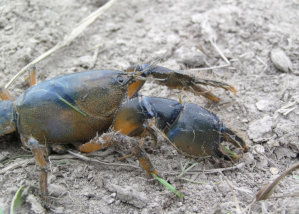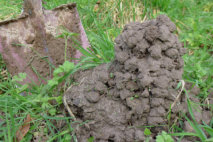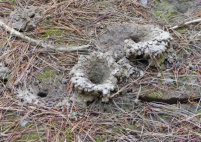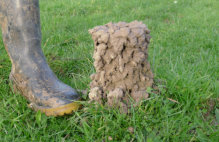Threatened Burrowing Crayfish of
West Gippsland
Burrowing Crayfish
What is a burrowing crayfish? / Who’s making those chimneys?
Burrowing crayfish are often called terrestrial or land crayfish because they rarely inhabit open waters. Instead, they spend most of their lives on land in underground burrow systems. They belong to the genus Engaeus. While you may never have seen a burrowing crayfish before, you will most likely be familiar with the large mounds of soil that pop up in wet areas, especially during the rainy weather. These are the “chimneys” built from balls of mud and placed around the entrances to the crayfish burrows. They come in all sorts of shapes and sizes including tall and cone shaped, small and squat to fan shaped.Burrowing Bodies
In comparison to other crayfish that live in open water, burrowing crayfish have adapted their bodies for their specialised burrowing capabilities. This includes their small
size, a reduced swimming tail, smaller eyes and antennae. One way you can identify burrowing crayfish from other crayfish groups is by the way they hold their chelae or
claws. Burrowing crayfish hold their claws vertically to help with their digging lifestyle, while those belonging to other groups hold their claws in a more horizontal
position.
| Burrowing Crayfish | | Gippsland Crayfish | | Native Crayfish | | Australian Native Crayfish | | Warragul Burrowing Crayfish | | Threatened Burrowing Crayfish | | Endangered Burrowing Crayfish |
Web Site by VP-IT
All photographs © Dr. Beverley Van Praagh, Invert-Eco unless otherwise stated. No image may be saved, copied, reproduced or distributed without prior permission from the copyright owner.
Click image to enlarge
Click any image to enlarge
Burrowing crayfish hold their claws in
a vertical position
Burrowing crayfish chimneys may be found in many shapes and sizes,
ranging from a few centimetres tall to over 40 cm

Further information:
West Gippsland Burrowing Crayfish

















